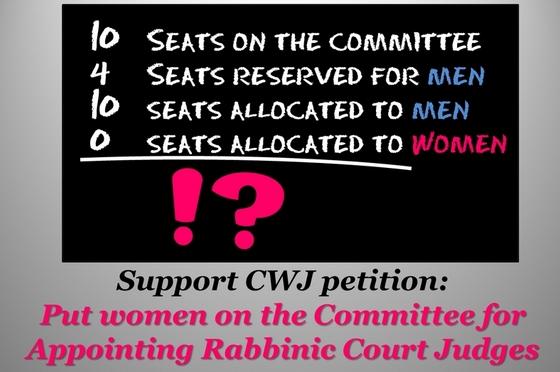
On Monday, 26/11/12, the Supreme Court will hear arguments on a petition to appropriate representation for women on the Committee for Appointing Rabbinic Court Judges. The petition was filed by the Center for Women’s Justice (CWJ) on 31/1/12, and was joined by the Israel Women’s Network, Kolech, the Rackman Center for the Advancement of Women’s Status, Mavoi Satum, the Hiddush Movement for Freedom of Religion in Israel, the Yerushalmim Movement for a Pluralistic Jerusalem and the GRANIT Association. The respondents in the case include the Committee for Appointing Rabbinic Court Judges, the Knesset, the government of Israel, the Israeli Bar Association and the Minister of Justice.
As set down by Israeli law in 1955, the appointment committee consists of 10 delegates. In November 2011, the Israeli Bar Association selected its representatives, completing the process of assembling the current committee. The resulting committee did not include any women. In response, Emunah, the national religious women’s movement, filed a petition demanding that the committee include women, without relating to a specific number of women. This would make it possible for the Knesset and the Israeli Bar Association to choose just one woman. A Supreme Court deliberation in January raised the possibility of adding an 11th member - a woman - to the committee; another bill under consideration in the Knesset would reserve two places on the committee for women.
The current law allocates four slots for men - - two for the Israeli chief rabbis and 2 for rabbinical court justices. CWJ’s petition states that the requirement to reserve four places for men without a similar number for women is a serious affront to justice and equality. “This practice contradicts the State’s commitment, under international law, to eliminating all forms of discrimination against women,” says attorney Susan Weiss, director of CWJ. “It also contradicts the 1951 Equal Rights Law, which mandates adequate representation of women in public bodies.”
In order to balance the inherent inequality of the Committee to Appoint Rabbinic Judges, Weiss continued, it is not enough to settle for one female representative. “Symbolic representation is not enough,” she insists. “There must be at least four women on the committee. This situation is a disgrace to justice in Israel and demands immediate change.”
The Center for Women’s Justice is a legal advocacy organization leading the struggle for dignity and justice for women in Jewish law. CWJ places moral and religious dilemmas relating to women on the public agenda, including aguna, get refusal, conversion and mamzer, and promotes comprehensive halachic and legal solutions to these issues.





 RSS
RSS